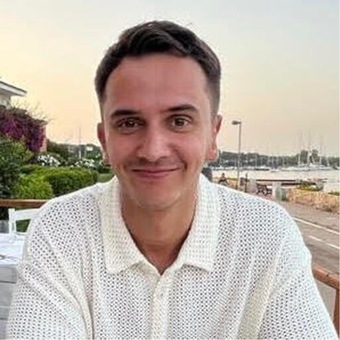Jade Malda: From Finance Executive to Junior Software Engineer - A Career Transition Story
 Nico Desai
Nico DesaiAt Lendable, career growth and internal transitions are not just encouraged—they’re fully supported. Jade Malda’s inspiring journey from Finance Executive to Junior Software Engineer showcases how curiosity, the right support, and a willingness to learn can lead to exciting new career paths.
In this blog post, Jade shares her experience of discovering her passion for software engineering, the steps she took to make the transition, and the invaluable guidance she received from colleagues along the way.

Please could you share your career journey to becoming a junior software engineer with us?
To be completely honest, I never really wanted to work in finance. From the start, I knew I wanted to move on once I figured out what exactly I wanted to pursue. The challenge is, there are so many career paths out there, and it’s hard to know what you want to do until you’ve seen some of those options. One thing that working as an accountant did provide was exposure to a wide variety of businesses.
Interestingly, my partner is a software developer, and most of the like-minded people I met at Lendable were in the engineering department. It was a field I knew very little about, but the more I talked with my partner about his work and colleagues, the more I realised how much it suited me. The idea of working on something different every day, using my logical brain, and creating something from scratch—it all sounded too good to be true.
I finally took the plunge. I mentioned my interest to the CTO during a boat trip party (well, actually, he brought it up after hearing I was intrigued), and about six months later, I was contributing to the Lendable codebase!
What steps did you take to acquire the necessary skills and knowledge for a career in software engineering, especially considering your background in finance?
I had almost no experience in software engineering, but I was driven by a strong desire to learn something new and excel at it. I was fortunate enough to receive time off from my finance role to study, and I started with a full-stack crash course. For those unfamiliar, this type of course covers both front-end and back-end development in a short, intense format. Lendable played a key role in my transition.
I joined their graduate cohort and received extensive training on foundational engineering concepts. While my course gave me a starting point, nothing could truly prepare me for “the real world” like Lendable’s internal lessons did.
Coming from a finance background, I initially found learning programming confusing. I even went back to binary to grasp why computers can’t “naturally” perform basic maths. While finance and engineering don’t exactly go hand-in-hand, the logical problem-solving and critical thinking skills I developed as an accountant were incredibly useful.
How did you identify the gaps in your skills and knowledge and how did you address them?
One of the great perks of being a developer at Lendable is the training budget. My biggest challenge early on was simply knowing what to learn. There’s no official checklist of skills you need to master to become a developer — it’s always evolving.
Conferences were a game-changer for me. They exposed me to a variety of topics and skill levels, giving me months' worth of new things to investigate. The best part was interacting with speakers who were more than happy to explain concepts I didn’t quite understand. The developer community has been invaluable.
Within Lendable, the "lunch and learn" sessions have been fantastic for self-review, helping me pinpoint gaps in my knowledge. More recently, I’ve sought a mentor to help with more complex topics, and this has been incredibly beneficial — special thanks to Jordi!
What programming languages, tools, and technologies did you focus on learning during your transition?
I focused on PHP because that’s what Lendable needed at the time. I relied on resources like Udemy courses and SymfonyCasts tutorials. While I’m by no means a master, software engineering is a constantly evolving field, and mastering any language takes time.
Personally, I’m not great at learning from books, so I gravitated toward hands-on tutorials that allowed me to "code along." This method helped the concepts stick far better than passive learning would have.
In your opinion, what transferable skills from your previous role as a Finance Executive have been most beneficial in your new role?
Interestingly, I did a lot of “coding” in Excel as a finance executive, which was really just a bunch of if-conditionals. This gave me a strong foundation in logic, which is critical for programming.
Another transferable skill was the ability to find the figurative needle in the haystack, something accountants often do. Debugging code feels very similar. My experience collaborating with developers to scope out features for accounting software also helped. I had a solid grasp of what the product needed, which allowed me to deliver some quick wins for the finance department and the broader team.
What are your career goals in software engineering?
If I’m honest, my main goal was to make Lendable’s finance system significantly better, and that remains my focus. I don’t have a burning desire to climb the career ladder—I just want to write code that makes people’s lives easier. Anything beyond that is a bonus.
In software development, you never stop learning. The field is constantly evolving, and I plan to evolve with it.
In what ways did you leverage your existing relationships within the company during this career transition? Were there mentors or colleagues who provided valuable guidance and support?
My colleagues in the engineering team were instrumental in giving me the confidence to pursue this transition. Lendable's Chief Architect, Ben Challis, was the one who first mentioned my interest to our CTO. The hardest part about changing careers is having the confidence to believe you can, and Ben was a huge part of helping me overcome that hurdle.
Everyone at Lendable was incredibly supportive. Since I already knew most of the people who taught me, I felt comfortable asking questions without fear of judgement. My current team has been just as supportive, and that sense of camaraderie has been invaluable.
Can you describe the process of applying for the internal transfer?
My transition happened largely because I was curious and friendly, asking questions and showing interest. Timing played a role too.
If you’re hesitant to talk directly to a manager about a transfer, just ask someone in the team you’re interested in to inquire for you. Lendable has such a supportive community—people are happy to help.
Don’t be afraid to say hi and interact with people outside your team.
Lastly, what advice would you give to other professionals looking to transition into software engineering from a non-technical background?
My advice is simple: just try it. There are thousands of free courses on YouTube for small projects. If you enjoy it, dive into more structured learning, like SymfonyCasts, which I can’t recommend enough!
Make sure you genuinely want to do it before committing. Get some experience to show your willingness, and then ask for an opportunity. Worst case? You’ll keep building fun side projects until the right opportunity comes along.